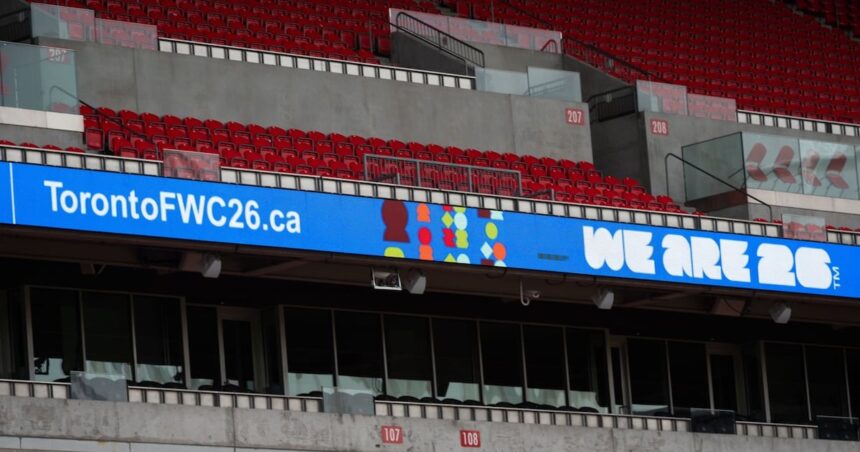Toronto’s heart pulsed with excitement yesterday as officials unveiled the city’s FIFA World Cup 2026 countdown clock at Nathan Phillips Square. The sleek digital display now stands as a constant reminder that we’re officially one year away from hosting one of the world’s most prestigious sporting events.
“This clock isn’t just counting down time—it’s counting up anticipation,” remarked Mayor Olivia Chow during the unveiling ceremony. “Toronto is ready to welcome the world to our doorstep.”
The installation drew hundreds of soccer enthusiasts despite the unseasonably chilly morning. Children in team jerseys kicked balls across the square while parents snapped photos beneath the iconic Toronto sign, now temporarily adorned with FIFA World Cup branding.
As a journalist who’s covered Toronto’s evolution for over a decade, I’ve witnessed numerous milestones, but the energy surrounding this countdown launch felt uniquely electric. Local business owners I spoke with shared my sentiment.
“We’ve been preparing for this moment since the bid was approved,” explained Sophia Mendez, owner of Kickback Sports Bar on King Street. “The World Cup will transform our summer business completely. We’re already taking reservations for game days.”
Tourism Toronto estimates the economic impact could exceed $307 million for our city alone, with visitors expected from every corner of the globe. The organization projects approximately 200,000 international visitors will descend on Toronto during the tournament.
BMO Field, which will host several matches, is undergoing significant renovations to accommodate FIFA standards. The expansion will temporarily increase seating capacity from 30,000 to 45,000 spectators.
“The transformation of BMO Field represents our commitment to delivering a world-class experience,” noted John Williams, Toronto’s World Cup venue coordinator. “Every aspect of the stadium experience is being enhanced, from entry points to concessions.”
Beyond the economic boost, community leaders emphasize the cultural significance of hosting such a diverse international event. Local soccer clubs report registration spikes among youth players, with some programs seeing waitlists for the first time in years.
Toronto’s multicultural neighborhoods are particularly energized. Little Italy, Koreatown, and Little Portugal have already begun planning street festivals to coincide with key matches.
“Soccer brings our communities together like nothing else,” said Carlos Oliveira, president of the Portuguese Cultural Association. “When Portugal plays, our neighborhood transforms into a sea of red and green. Now imagine that energy amplified across the entire city.”
The countdown clock itself features an innovative design that includes a QR code linking visitors to a digital hub of World Cup information. The platform offers details about volunteer opportunities, cultural events, and transportation planning.
City officials also unveiled comprehensive transit plans to handle the influx of visitors. The TTC will expand service hours and frequency during match days, while dedicated shuttle routes will connect major hotels with BMO Field.
“Transportation infrastructure represents our biggest challenge and opportunity,” admitted TTC spokesperson Janet Chen. “We’re treating this as a chance to demonstrate Toronto’s capability to move masses efficiently.”
Local businesses are already capitalizing on World Cup fever. Retailers report surging sales of soccer merchandise, while restaurants across the city are crafting special menus and viewing experiences.
“We’re creating a global food journey for customers,” explained chef Tomas Rodriguez of Downtown’s Hemisphere Restaurant. “Each week leading up to the tournament, we’ll feature cuisine from qualifying nations.”
Having covered Toronto’s previous attempts to secure major international sporting events, I’ve noticed a significant shift in public sentiment. The excitement feels more universal this time, crossing demographic and socioeconomic boundaries.
The countdown clock will remain at Nathan Phillips Square until the tournament concludes in July 2026. Officials encourage residents to use the installation as a backdrop for photos, sharing them with the hashtag #Toronto2026.
As visitors left yesterday’s unveiling, volunteers distributed pocket schedules and information about becoming World Cup ambassadors. The city aims to recruit 4,000 volunteers to assist visitors throughout the tournament.
For Torontonians, the countdown clock serves as both a reminder and a promise—that our city stands ready to welcome the beautiful game’s greatest showcase, and that the next 365 days will transform Toronto into a global soccer destination.
The clock is ticking. Toronto is ready.







